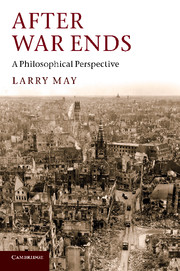Book contents
- Frontmatter
- Contents
- Acknowledgments
- Chapter 1 Introduction
- Part I Retribution
- Part II Reconciliation
- Part III Rebuilding
- Part IV Restitution and reparation
- Chapter 10 Restitution and restoration in jus post bellum
- Chapter 11 A Grotian account of reparations
- Part V Proportionality and the end of war
- Bibliography
- Index
Chapter 11 - A Grotian account of reparations
Published online by Cambridge University Press: 05 June 2012
- Frontmatter
- Contents
- Acknowledgments
- Chapter 1 Introduction
- Part I Retribution
- Part II Reconciliation
- Part III Rebuilding
- Part IV Restitution and reparation
- Chapter 10 Restitution and restoration in jus post bellum
- Chapter 11 A Grotian account of reparations
- Part V Proportionality and the end of war
- Bibliography
- Index
Summary
Hugo Grotius wrote a treatise on the spoils of war that has been often neglected over the years. I will work within the framework of Grotius’s account, at least in the early sections of the chapter, in setting out an account of how to think about reparations at the end of war. In the end I will reject Grotius’s expansive claims about what a party is entitled to after war ends if it has had a just cause to start the war. And I will employ arguments from a Grotian perspective in order to find a more plausible way to limit the claims of reparations after a war ends, even for those States that were forced into a war by States that did not have just cause to initiate it. Along the way I will develop a normative principle to guide us in thinking about the limits of reparations along with a discussion of alternative accounts of what reparation involves.
In this chapter I want to examine critically the expansive claims that Grotius makes for how we understand jus post bellum reparations. In particular I am interested in the question of whether and to what extent punishments and other penalties can be assessed against a vanquished State as a matter of reparations. First, I will begin with some general remarks about the nature of reparations and I will discuss the uncontroversial things that are thought to be included in reparations. Second, I then look at special problems of reparations at the end of a war or mass atrocity. Third, I will turn back to Grotius to see what the developed argument for punitive reparations would be. Fourth, I will advance some arguments for thinking that a plausible Grotian position would not be as expansive as that actually defended by Grotius himself. Fifth, I will consider a set of reasons for extending leniency in certain cases where reparations are due. Finally, I will then end by considering several criticisms that could be mounted against my revised Grotian conception of jus post bellum reparations.
- Type
- Chapter
- Information
- After War EndsA Philosophical Perspective, pp. 200 - 216Publisher: Cambridge University PressPrint publication year: 2012

